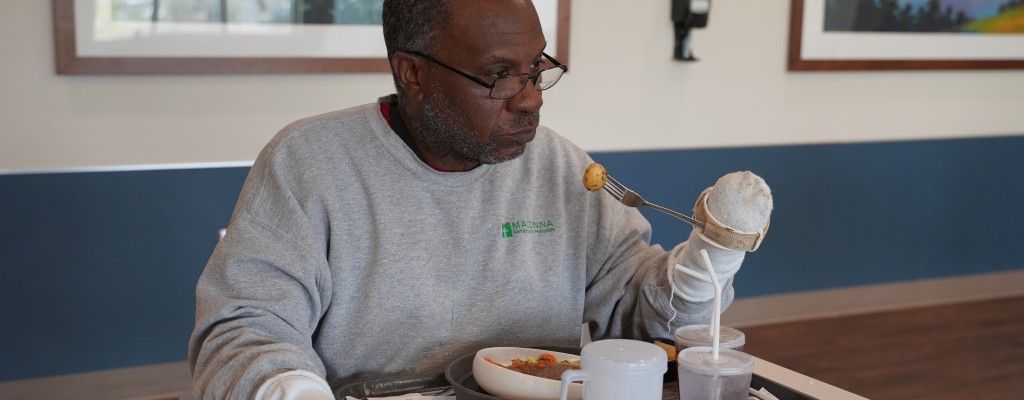Daily tasks like eating, showering and getting dressed now look different for 57-year-old Kenneth “Kenny” Steele. The Council Bluffs, Iowa, native is learning how to adjust after having all 10 fingers amputated in January.
“I suffered some frostbite and all the nerves in my fingers were dead,” Kenny said. “The doctors told me they either had to amputate it or it could lead to gangrene, so they amputated all my fingers on both hands.”
Kenny said losing the ability to use his hands was shocking and scary, but it also inspired a ‘can-do’ spirit.
“I know I have to do everything myself because I live alone,” Kenny said. “I’m learning to persevere through.”
Supporting Kenny on his journey to independence was Madonna’s team of experts, including occupational therapist Bianka Alvarado Milla, OTR/L.
“He would tell me it was just so hard to analyze what was happening, and he kept wondering what life would look like for him,” Alvarado Milla said. “Occupational therapy to me means helping individuals get back to things that are meaningful to them whether they do them the same way they used to or in a modified way.”
With help from Madonna’s St. Benedict Fund, Alvarado Milla collaborated with Kenny and assistive tech experts to identify adaptive equipment that could help him achieve his maximum level of independence. The pair purchased voice-activated technology to control his television and phone, and things like adapted vegetable peelers, automatic drink dispensers and specialized cookware that Kenny can use when he returns home.
“From the beginning, I could tell he was just so confused and lost because he didn’t know his options, so it was really nice to be able to take one little piece of his life and figure it out, and then another one,” Alvarado Milla said.
Some of Kenny’s favorite adaptations involved his cell phone. His therapy team taught him how to use Siri, modified his settings to fit his needs and purchased a phone charging mat so Kenny doesn’t have to worry about plugging in a charger.
“He can now make phone calls, send text messages, and use the little stand for his charger,” Alvarado Milla said. “Maybe for the rest of us, it’s such a simple thing, but for him—the ability to physically take a phone and put it on a little surface to charge—[it]was everything. Having more access to his cell phone was really motivating for him during his stay.”
If she couldn’t find an existing product, Alvarado Milla 3D printed tools to help Kenny problem-solve everyday challenges. Among her creations was a universal wrist cuff that can hold a stylus or silverware, a wearable device to open doors, and a system to help Kenny put on socks.
“She’s a pure genius,” Kenny said. “She’s innovative. She’s an exceptional problem-solver, and she pushed me and challenged me to do things on my own.”
As Kenny became more skilled with his new adaptive pieces of technology, Alvarado Milla challenged him even more. She had him participate in Madonna’s Work Re-Entry Program, helping prep food in the facility’s kitchen.
“One of the last things we were working on with Kenny was his ability to manage things in the kitchen, whether that was opening a container or cooking and cleaning,” Alvarado Milla said. “He goes to Madonna’s kitchen and he works on using his adaptive tools to cut vegetables, peel vegetables, and then organize things, packing cookies. He does a lot of things there. He’s run the dishwasher. Just basic cooking and cleaning things that he can incorporate at home.”
While his therapists challenged him, Kenny also pushed his therapists and their creativity.
“Working with Kenny has been a life-changing experience for me, because he was the first patient that I’ve ever had that was a bilateral partial hand amputee, so at first it was somewhat challenging,” Alvarado Milla said. “But, as time went by and his spirit was so positive, it was really fun to problem-solve. If something didn’t work out, we would just laugh it off and try again the next day. Having a positive attitude was just so big for him.”
For Kenny, his new equipment gives him renewed confidence about the future.
“It feels like a real sense of satisfaction and freedom to know I can do things on my own with or without prosthesis,” he said. “The people at Madonna have taught me to be independent regardless of the situation and how to adapt and problem solve.”






